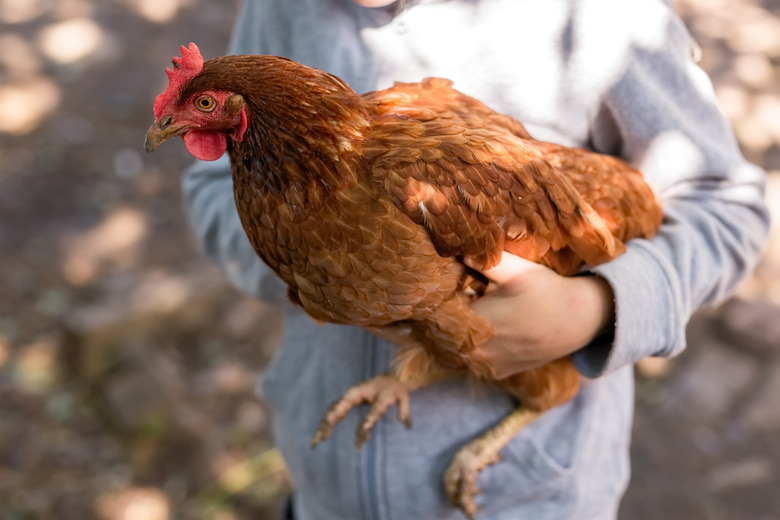Characteristics Of A Mother Hen
Mother hens demonstrate behavioral habits that deviate from other chickens. After hatching eggs, their priority shifts from personal survival to protecting and ensuring the survival of her young chicks who can be threatened by predators and other hens in the flock. Broody hens, who are not always mother hens, may assist with incubating eggs. The mother will teach them basic skills while guarding them until they are mature.
Mother hens prepare for chicks
Mother hens prepare for chicks
The characteristics of a hen and a rooster are very similar, but mother hens are the ones who raise the chicks. Before a mother hen lays her eggs, she begins to look for a place to nest and eats, sleeps, and preens. Mother hens sometimes stay in the nest after laying eggs, or may leave for a time. Sometimes eggs are laid outside of nests when dominant hens prevent other hens from entering nests.
Broody hens help raise chicks
Broody hens help raise chicks
Broody hens demonstrate a strong desire to successfully hatch their eggs. A broody hen is not necessarily a mother hen but she has the natural desire to become a mother hen. Broody hens will lay eggs in the nesting boxes and will avoid laying eggs outside the box at all costs. They are territorial around the nesting box and will attempt to sit on the eggs. Some chicken breeds are more likely to be broody, like Cochins, Buff Orpingtons, and Silkies.
Mother hens and chicks verbal communication
Mother hens and chicks verbal communication
Mother hens and chicks use verbal commands to communicate. In fact, there's even scientific evidence of prehatching interactions between mother hens and embryos as they approach hatching. Hens and chicks will recognize their distinct sounds and stay together. They do not mistake the vocalization of other chicks for their own offspring. The mother hen's vocalizing makes the chicks aware of her location and keeps the chicks in her range. She naturally will lead the chicks to food and water. However, mother hens do not have favorite chicks and do not show a preference for any of them.
If a chick is unable to see the mother hen, the chick will give a distress call. When the mother hen hears the call, she will go in the direction of the sound, but if the mother hen can see but not hear the distressed chick, she will not go to it.
Mother hens are defensive
Mother hens are defensive
Mother hens are protective of their chicks and they are often aggressive toward chicks of another mother. Separating mothers from chicks other than their own is often necessary to prevent mortality. The hens will peck at other chicks and cause physical harm. In some instances, they will peck until they kill the chick.
Mother hens will gather and herd their own chicks to protect them against pecking and aggression from predators and other hens. She will gather the chicks under her wings to protect them when a threat is present. Mother hens are calm around people if they are accustomed to people in their space. Otherwise, they will herd chicks away from people and may even charge in an attack.
Mother hens will teach chicks
Mother hens will teach chicks
Mother hens provide an education to their young chicks. Chicks will not drink water until they are taught or accidentally discover water by pecking at reflections and bubbles. Mothers will press their beaks into the water to help them discover and learn the drinking process. The chicks will fight among themselves and the mother will regulate and stop the behavior if she sees an outside threat. Otherwise, mild fighting is normal among the chicks as they set the pecking order in their group.
